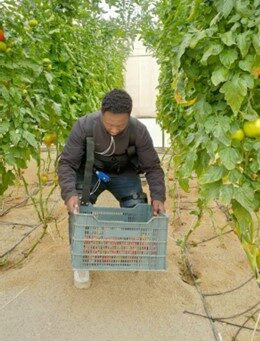Pilot Experiments
EXOGREEN: SMART ACTIVE EXOSKELETON FOR GREENHOUSE WORKS
Spain
![]() FUNDACION PARA LAS TECNOLOGIAS AUXILIARES DE LA AGRICULTURA
FUNDACION PARA LAS TECNOLOGIAS AUXILIARES DE LA AGRICULTURA
Experiment objective
The EXO-GREEN experiments aims to adapt, test and validate in real working conditions, until a TRL8 stage, an active exoskeleton for lumbar support, based on AI techniques, specially adapted to the requirements of the agricultural greenhouse works, aiming to help workers to realize heavy and physically demanding tasks, and to avoid MSDs.
The project aims to demonstrate the benefits of exoskeleton technology in different agricultural greenhouse operations. Wearable robotic systems (active exoskeletons) can help workers involved in these activities to realize heavy and physically demanding tasks, contributing to reduce fatigue and decrease muscle-skeletal disorders (MSDs). The main goal of the project is to adapt to specific requirements from these kinds of works and to test under real working conditions. Main benefit will be the reduction of muscle-skeletal disorders (MSDs) in agricultural workers.
Challenges
The agricultural sector is one of the industrial sectors more affected by muscle-skeletal disorders (MSDs) of the workers. Not all the activities necessary in greenhouse production can be fully automated or robotized. Unfortunately, some of these activities must continue to be performed manually, even if they place a heavy physical strain on workers.
At the same time, practical use of exoskeletons in agriculture is often faced with technical and non-technical challenges, due to the very low introduction rate of this new technology in the agriculture sector.
Implementation Solution
EXO-GREEN will work in the agrifood domain within two scenarios representative of greenhouse labours. The implementation will first follow an adaptation of the exoskeleton for specific users’ requirements to the activities in greenhouse production; leading to the preparation of a prototype. The new prototypes will be validated in a laboratory withing two scenarios: vertical guided vegetable crop and ground crop. The exoskeleton support will be adapted to the specific requirements of the greenhouse sectors.
Results Obtained
The activities were performed first without exoskeleton and then with the exoskeleton, to assess the difference between processes. A user’s satisfaction was also considered during these tasks. The main result of the experiment is a product in the form of an active exoskeleton for lumbar support. It provides lower back assisted movement using assist-as-needed algorithms, implemented on an advanced robotic control based on non-invasive sensing technology and AI techniques (deep learning). This wearable robotic system helps workers to lift and manage heavy weights protecting the lumbar zone and decreasing back pain. The lower back assisted movement is using assist-as-needed algorithms, helping workers to lift heavy weights (until 40 kg) protecting the lumbar zone and decreasing back pain.
Impact of the experiment
The impact of the experiment is significant – economic and societal wise as most offers on the market are passive exoskeletons, not suitable for managing the heavy loads and tools required for greenhouse works. ALDAK technology represents a disruptive innovation in wearable robotic for outdoor works. It provides lower back assisted movement using assist-as-needed algorithms, implemented on an advanced robotic control based on non-invasive sensing technology and AI techniques (deep learning).
Dissemination
On November 25, 2021, a notice was published on the Gogoa website to announce the start of the EXO-Green project, both in Spanish and English. The notice is available at:
In March 2022, TECNOVA makes a new publication on LinkedIn, about the progress of the project. This publication was shared also by GOGOA in LinkedIn:


